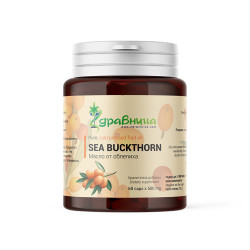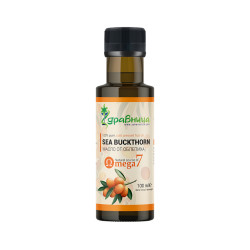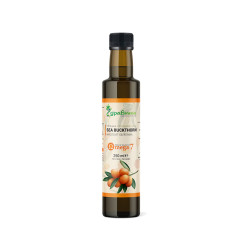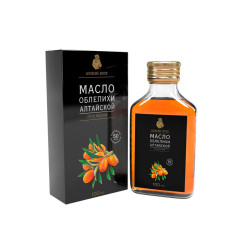The healing properties of sea buckthorn have been known since antiquity. The unique properties of sea buckthorn are used in folk and traditional medicine for treatment and prevention of many diseases.
Composition of sea buckthorn oil:
- Fats - Omega-3 (4-6%), omega-6 (15-16%), omega-9 (10-13%);
- Unsaturated fatty acids - stearic (1.5%), myristic (1.5%);
- Phospholipids;
- Amino acids - sea buckthorn contains 18 amino acids including valine, histidine, isoleucine, leucine, lysine, tronin, phenylalanine;
- Non-essential amino acids - alanine, arginine, aspartic acid, glycine, glutamic acid, likopetin, pick-carotene;
- Phytosterols;
- Including flavonoids rutin and kaempferol;
- Triterpene acids;
- Organic acids - tartaric, Salicyloyl oxalic, malic, succinic;
- Tannins - serotonin, pectin, coumarin, alkaloids;
- Vitamins - B1, B2, B3, B6, B9, C, E, K, P;
- Micro- and macro elements - 27 minerals including aluminum, iron, calcium, cobalt, magnesium, manganese, nickel, phosphorus, zinc, etc .;
Sea buckthorn oil has a high content of tocopherol (vitamin E), and contains powerful antioxidants. The oil of sea buckthorn also features the content of vitamin C. The amounts of this vitamin in no way inferior to its content in lemons and oranges.
Useful properties:
- Inflammation of the lining of the digestive tract. The oil can also be used in complex therapy of gastric ulcers and duodenal ulcers;
- Gynecological diseases: cervical erosion, colpitis, vaginitis;
- Burns, radiation injuries and skin injuries. The oil of sea buckthorn is extremely useful since suffered himioetarpii and exposure.
- Chronic diseases of the upper respiratory tract - pharyngitis, laryngitis, sinusitis;
- Ulcers of the cornea;
- Inflammatory diseases and periodontal gum;
- Atherosclerosis;
- Psoriasis and neurodermatitis;
- Against wrinkles, freckles, pigmentation, acne, dermatitis, skin fissures;
- To improve vision;
- To prevent the formation of blood clots.







